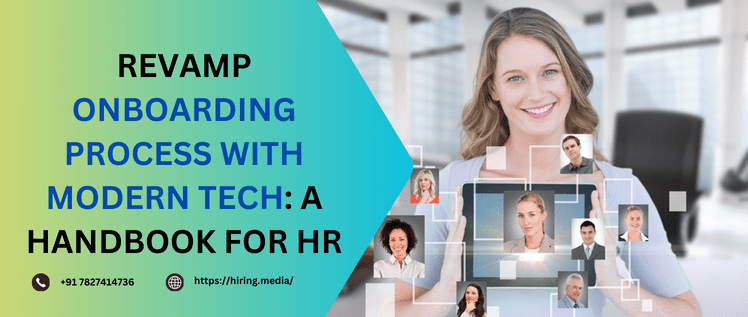The initial weeks at a new company holds immense significance. It’s the time for new hires to absorb information, feel welcomed and get acclimated to their roles and the company culture. A well structured onboarding process is the key to a successful integration. But how can HR departments leverage modern technology to create a truly engaging and effective onboarding process?
In this blog, explore the benefits of revamping your onboarding process with modern tech solutions. Delve into some of the tools and technologies to improve the onboarding process and other things in HR.
Why to Modernize the Onboarding Process?
The traditional onboarding processes can feel outdated and impersonal with paper forms and lengthy classroom sessions. Here’s how modern tech can improve your onboarding process:
- Automating tasks like paperwork and IT setup frees up the valuable HR time and allows the new hires to focus on learning and development thereby increasing efficiency.
- Interactive learning modules and gamified elements can make the onboarding more engaging.
- Tailoring the onboarding journey to the specific roles and styles creates a more welcoming and relevant experience promoting personalized experiences.
- Utilizing communication platforms fosters better collaboration and facilitates two-way communication between new hires and HR or managers.
- Streamlined processes and readily available resources ensures new hires can contribute meaningfully sooner for improved productivity.
7 Ways Technology Makes Onboarding Process a Breeze
Technology offers a treasure trove of tools to refine the onboarding process, benefitting both employers and new hires. Here are 7 tried-and-tested ways tech is revolutionizing onboarding process:
Digital Onboarding Platforms: Imagine ditching the paper jungle! Digital onboarding platforms streamline the process by providing a one-stop shop for new hires to complete essential tasks like filling out forms, accessing company policies, and familiarizing themselves with benefits information. These user-friendly platforms are accessible 24/7, allowing new hires to complete tasks at their own pace, even before their first day.
E-Learning Tools: Gone are the days of dry, text-heavy manuals. E-learning tools transform company knowledge and skills into interactive modules, videos, and gamified experiences. New hires can learn about the company culture, software applications, and industry best practices in a format that’s engaging and easy to retain.
Social Collaboration Tools: Building connections with colleagues fosters a sense of belonging and reduces feelings of isolation. Modern collaboration tools like Slack or Microsoft Teams help new hires connect with colleagues across departments, ask questions in real-time, and participate in virtual team-building activities.
Performance Tracking Tools: Regular feedback is crucial for new hires to feel valued and adjust to their roles effectively. Performance tracking tools allow managers to provide ongoing feedback and track progress towards goals. This not only motivates new hires but also helps identify areas for improvement early on.
Mobile Applications: We all carry our smartphones with us. Mobile onboarding apps provide a convenient way for new hires to access company information, complete tasks on the go, and stay connected with the onboarding team. Imagine receiving push notifications with reminders or updates – it’s like having a handy pocket guide to your new workplace.
Virtual Reality (VR) for Immersive Training: For some roles, traditional training methods might not be enough. VR technology allows new hires to step into simulated work environments, practice tasks in a safe space, and gain valuable experience before tackling real-world scenarios. Imagine a new customer service representative virtually practicing de-escalation techniques – VR makes it possible!
AI-Powered Assistants: Imagine having a friendly, virtual assistant to answer your questions 24/7 during your onboarding journey. AI-powered assistants can provide real-time support, answer frequently asked questions, and even recommend helpful resources based on a new hire’s role and needs.
Conclusion
By embracing modern technology, HR departments can create an onboarding process that is efficient, engaging, and sets new hires up for success. From streamlining paperwork to fostering a sense of community, the right tech tools can empower new hires to thrive in their new roles and become valuable members of your team.
Remember, a well-designed onboarding process is an investment in your company’s future. By leveraging modern technology, you can create a positive and lasting first impression that fosters employee retention and drives long-term success.
Frequently Asked Questions (FAQs)
Q1. What is the importance of modernizing the onboarding process?
Ans. Modernizing the onboarding process ensures a smoother transition for new hires, enhances their engagement, and boosts overall productivity. It also reflects positively on the employer brand.
Q2. How can technology improve the onboarding experience for new employees?
Ans. Technology can streamline administrative tasks, offer interactive training modules, provide personalized onboarding journeys, facilitate remote onboarding, and enable efficient communication between HR and new hires.
Q3. What are some common challenges in traditional onboarding methods that technology can address?
Ans. Traditional onboarding methods often involve manual paperwork, lack of consistency, limited engagement, and difficulties in tracking progress. Technology can automate paperwork, standardize processes, increase interactivity, and provide analytics for better tracking and improvement.
Q4. What types of modern tech solutions are available for revamping the onboarding process?
Ans. Modern tech solutions include onboarding software platforms, digital learning management systems (LMS), virtual reality (VR) training modules, chatbots for answering employee queries, electronic signature tools for paperwork, and mobile apps for remote onboarding.
Q5. How can HR departments ensure a successful transition to using modern tech for onboarding?
Ans. HR departments can ensure success by conducting thorough research on available technologies, seeking employee feedback, providing comprehensive training to both HR staff and new hires, continuously evaluating and optimizing the onboarding process, and staying updated with emerging trends in HR tech.

